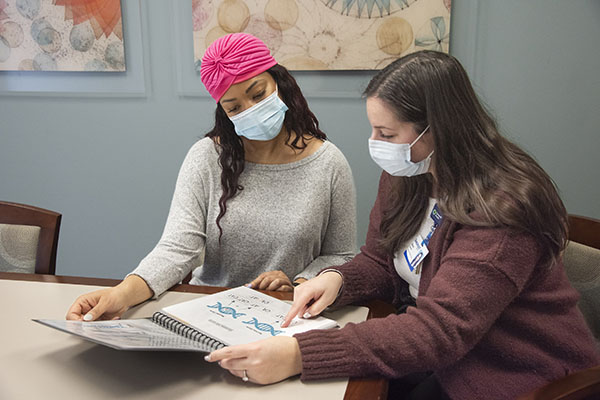Friday, March 24, 2023

Primary care doctor uncovers genetic risk by asking family history question, recommending appropriate testing
Sarina Oden, 41, of Farmington Hills was the first in her family to discover she is a carrier of Lynch syndrome, an inherited disorder that increases the risk of many types of cancer, particularly colon cancer. And it was all because her primary care doctor asked one question: “How is your family?”
“My doctor, Sandra Lerner, asked me how my mom and dad were doing,” Oden said. “I told her my dad just had both colon and prostate cancer and my mom has Leukopenia, a condition where the body doesn't have enough disease-fighting leukocytes in the blood.”
Oden shared that she also lost another close family member to breast cancer.
“Dr. Lerner noted that I had a lot of cancer in my immediate family and asked if I’ve ever thought about doing a cancer genetics test,” Oden said. “I never even heard of it.”
The discovery
Oden said she immediately made an appointment, which consisted of filling out an in-depth family history form and meeting with a genetic counselor and physician at the Nancy and James Grosfeld Cancer Genetics Center, inside Corewell Health’s Beaumont Hospital, Royal Oak. And once Oden understood the test and gave her consent, she had blood drawn and sent to a lab to screen for improper gene abnormalities.
Weeks later, she got her results: She had Lynch syndrome.
“I didn’t have a clue of what it was to be honest with you,” Oden recalled. “I was like, ‘OK, what does that mean?’”
Oden soon learned that Lynch syndrome, also known as hereditary non-polyposis colorectal cancer, is the most common cause of hereditary colon cancer.
According to the Centers for Disease Control and Prevention, people with Lynch syndrome are more likely to get colorectal cancer and other cancers and at a younger age (under 50). Some of the other cancers include uterine (endometrial), stomach, liver, kidney, brain and certain type of skin cancers.

A proclamation made by Gov. Gretchen Whitmer deems this week – March 19-25, 2023 – as Lynch Syndrome Awareness Week in Michigan.
“When I first found out, it was more of a shock,” Oden said. “But when I kept talking to the doctor, it made me feel better because she kept saying that with knowing this information, we can do preventative things to help me.”
First colonoscopy: age 41
One of the preventative measures Oden took: getting a colonoscopy before the American Cancer Society’s recommended age of 45.
Knowing she carried Lynch syndrome, she scheduled her first colonoscopy at 41 years old, and doctors removed three polyps that were benign.
“I was just so blessed to be able to remove the polyps because they could have developed into cancer if they stayed in my colon, especially knowing I wouldn’t have gotten a colonoscopy for at least four more years otherwise,” Oden said.
The doctor she worked with for her genetic testing, Dr. Dana Zakalik, corporate director of Corewell Health’s Nancy and James Grosfeld Cancer Genetics Center, said patients with Lynch syndrome start colonoscopies as young as 20-25 or 30 years old, depending on which of the Lynch genes they carry, and they screen for other cancers as well.
“This is a great example of how genetic testing can save lives,” Dr. Zakalik said. “By knowing that she has the gene, she can start screening much earlier, thus allowing for earlier diagnosis and prevention.”
Oden’s newfound knowledge of this gene mutation, along with her history of fibroids, also led to additional testing with her OB/GYN to determine if there is any cancer developing within her endometrial lining.
Message: be proactive
Oden said finding out she has Lynch syndrome has ultimately been a blessing.
“I’m one of those people who likes to be proactive,” she said. “I’m proactive with my health, my job. I like knowing stuff, so I can be prepared.”
Not only does she hope her story inspires others to get tested and be proactive in their own health journey, but she’s also hoping it leads to answers for her own family members, including her sibling and 4-year-old son, who could potentially carry the gene.
Her advice: “Don’t be scared to find out. It’s not a death sentence. It’s just awareness. The more we’re aware and know about ourselves, the more it can help and make a difference in the long run.”
Women’s Wellness Day | May 6, 2023
Learn about the latest in women's wellness from expert physicians, including Drs. Zakalik, Shakir and Al-Wahab, who will be discussing genetic cancer risk, reducing cancer risks and more.
